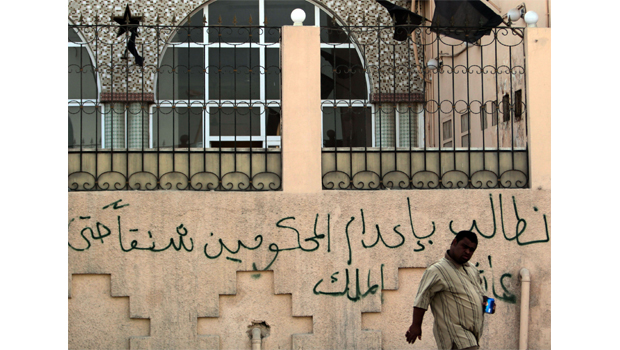A report by the Bahrain News Agency said the court upheld death sentences against Ali Abdullah Hassan Al-Singace and Abdul Aziz Abdul Redha Ibrahim Hussein, who were accused of killing the policemen intentionally by running them over with a car.
BNA identified two other accused whose death sentences were reduced as Qasim Hassan Mattar Ahmed and Saeed Abdul Jalil Saeed.
Bahraini state media last month aired government-produced videos that including clips of purported confessions of the policemen’s killings. They also included testimonials from alleged relatives of one of the slain policemen and a taxi driver killed in the unrest.
The case was the first related to this year’s unrest, which was inspired by uprisings in Tunisia and Egypt.
Capital punishment is extremely rare in Bahrain and is typically not applied to the country’s citizens. A Bangladeshi man was executed last July after being convicted of premeditated murder.
The case is part of a series of closed-door trials in the Gulf island nation that have been criticized by rights groups and others opposed to the wide-ranging emergency laws used to quell demonstrations against Bahrain’s monarchy.
The appeals, like the trial before it, were heard in a special security court presided over by military and civilian judges. It was set up under emergency laws implemented in March during a government crackdown on the Shiite-led protests.
The security court is separately trying 21 opposition leaders and political activists, most of them Shiites, accused of plotting against the state. It last week sentenced a prominent Shiite cleric and eight others to 20 years in prison for the alleged kidnapping of a police officer.
The UN High Commissioner for Human Rights and other rights advocates have expressed concern about the trials in the strategic island nation, which is home to the US Navy’s 5th Fleet. At least 30 people have died since anti-government protests began in mid February by the majority Shiites, who are seeking greater rights and political freedoms from Bahrain’s Sunni rulers.
Nabeel Rajab, president of the Bahrain Center for Human Rights, is among those who have criticized the trials as politically motivated and lacking in transparency.
In a telephone interview Sunday, he said his house was attacked with tear gas as his family slept early the previous morning. Two tear gas canisters were shot through the windows of his home around 3:30 a.m. Saturday, and two others landed outside, he said.
Rajab blames state security forces for the attack. He said it is the second time tear gas has been hurled at his home in recent weeks.
“We know it’s the government, because nobody (else) can have tear gas in this country,” he said. “This is another act of intimidation and pressure so I stop my work ... I’ve been speaking a lot to the media, and that’s why I think I’ve been targeted.” The Bahraini government did not immediately respond to a request to comment on the allegations.
Hundreds of people — including protesters, opposition leaders, human rights activists and Shiite professionals — have been detained in recent months under the government’s martial law-style powers, which are set to be lifted June 1.
Bahraini authorities are moving to ease some restrictions earlier.
The military said Sunday it would lift a nighttime curfew in a central part of the capital Manama starting Monday, according BNA. Earlier this month, the curfew — in place since mid March — was trimmed to between midnight and 4 a.m.










